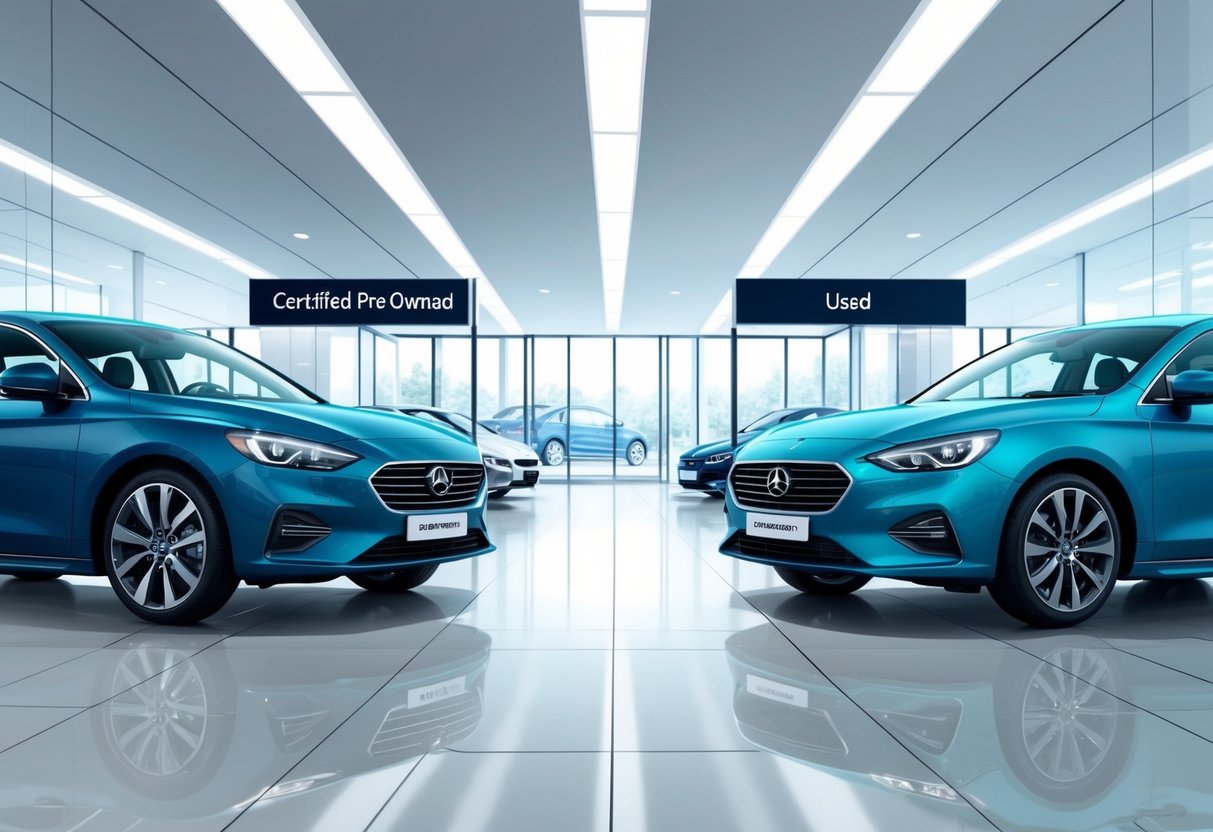
Types of Vehicles Available
The certified pre-owned (CPO) and used car markets offer a wide range of vehicle types.
Buyers can choose from popular sedans, versatile SUVs, durable trucks, and a broad lineup of Chevy models.
Both markets differ in selection, features, and benefits for each category.
Sedans in CPO and Used Markets
Sedans are among the most frequently available vehicles in both CPO and used markets.
The CPO market often focuses on late-model vehicles with lower mileage, providing buyers with options like the Honda Accord, Toyota Camry, and Nissan Altima.
These cars undergo manufacturer-backed inspections, typically covering brakes, engine, and electronics.
In the used car segment, the variety increases, including older models and a wider range of brands and features.
Pricing tends to be lower for non-certified sedans, though warranties are less comprehensive.
Consumers often find more choices for budget-friendly sedans, including compact and midsize options.
Choosing between a CPO and a regular used sedan largely comes down to a preference for warranty coverage versus a lower upfront cost.
Models found in both categories often include popular makes such as Hyundai Sonata, Ford Fusion, and Volkswagen Passat.
For buyers who value peace of mind, CPO sedans are a common recommendation for reliability and long-term dependability (more here).
SUV and Truck Options
The SUV and truck categories offer significant diversity in both certified pre-owned and used inventories.
In the CPO market, buyers can commonly find late-model SUVs such as the Toyota RAV4, Honda CR-V, and Ford Escape.
Popular trucks include the Ford F-150 and Toyota Tacoma, which often come with detailed inspection reports and extended powertrain warranties.
Non-certified used SUVs and trucks cover a broader model year range and price spectrum.
Shoppers will encounter more options for high-mileage and older vehicles, including full-size SUVs, compact crossovers, and work trucks.
Since these vehicles typically lack extended warranties, buyers need to pay close attention to maintenance records and vehicle history.
Options for family-friendly SUVs, off-road capable trucks, and commercial-grade pickups are abundant in both markets.
The main differences are that CPO vehicles often have stricter inspection standards and offer enhanced protection plans, making them appealing for buyers seeking lower risk and better reliability (learn more).
Availability of Chevy Models
Chevy models are widespread in both CPO and used inventories.
Certified pre-owned programs feature vehicles such as the Chevrolet Malibu, Equinox, Silverado, and Traverse.
These come with Chevy’s factory-backed warranty, additional inspection points, and complimentary services like roadside assistance.
In the used car market, buyers can find a wider range of Chevys, from older Impalas to various configurations of the Silverado and compact options like the Sonic.
Pricing is generally lower outside of the CPO programs, but buyers trade off warranty coverage and post-sale perks.
Table: Popular Chevy Vehicles
| Model | Type | CPO Availability | Used Availability |
|---|---|---|---|
| Malibu | Sedan | High | High |
| Equinox | SUV | High | High |
| Silverado | Truck | High | High |
| Traverse | SUV | Medium | High |
| Impala | Sedan | Low | High |
Whether buyers are looking for fuel-efficient sedans, family-ready SUVs, or durable trucks, Chevy’s model range is well-represented across both CPO and used markets.
This helps shoppers compare certified and non-certified options side by side depending on their budget and warranty needs (read about Chevy options).
The Certified Pre-Owned Buying Process
Shopping for a Certified Pre-Owned (CPO) car involves several distinct steps that can impact the buyer’s experience from initial assessment to final purchase.
Major considerations include the inspection during the test drive, available financing choices, and whether to purchase through a dealership or a private party.
Test Drive Experience
Taking a test drive with a CPO car is essential for making an informed choice. Dealerships offering CPO vehicles typically allow prospective buyers to thoroughly inspect the vehicle.
Sometimes, a checklist of inspection points reviewed as part of the certification process is provided. Buyers can expect a vehicle that looks, feels, and drives close to new.
Certified programs require multi-point inspections, so issues like unusual noises or poor handling are rare. During the test drive, it is important to test all critical features, including brakes, steering, electronics, and comfort.
Shoppers are encouraged to compare several models side-by-side to determine which CPO car offers the best comfort, technology, and driving experience. For more detail on typical inspection standards, see these CPO program requirements.
Financing Options
Financing a Certified Pre-Owned vehicle is often more straightforward than with a non-certified used model. Dealerships frequently provide special financing offers for CPO cars, sometimes at rates closer to those available for new cars.
Lenders may view CPO vehicles as less risky because of their condition, inspection history, and warranty coverage. Many manufacturers also include promotional rates or longer loan terms specifically for their CPO inventory.
Buyers should review available incentives and compare options with their own bank or credit union. More details about cost differences and financing are available on Kelley Blue Book’s CPO vs. used comparison.
Dealer vs Private Seller Purchases
Certified Pre-Owned vehicles are almost always offered through franchised dealerships, not private sellers. Dealerships must meet strict manufacturer requirements to offer a CPO car, including certified technicians and approved inspection processes.
Buying from a dealer often means access to warranties, roadside assistance, and other ownership perks that private parties cannot provide. CPO cars from dealers come with clear records, verified maintenance, and customer protections.
Private sellers may offer used vehicles at lower prices, but they cannot provide certification benefits or manufacturer backing. For a closer look at differences in purchase channels, see this detailed breakdown.